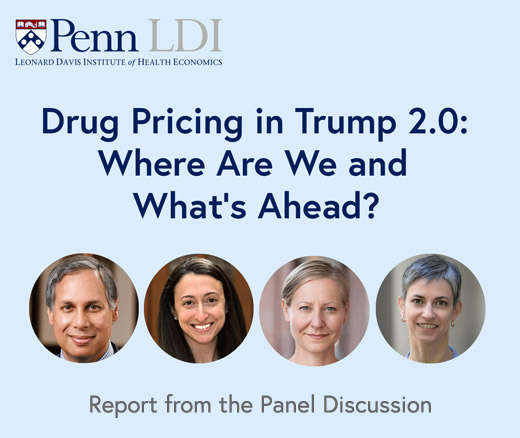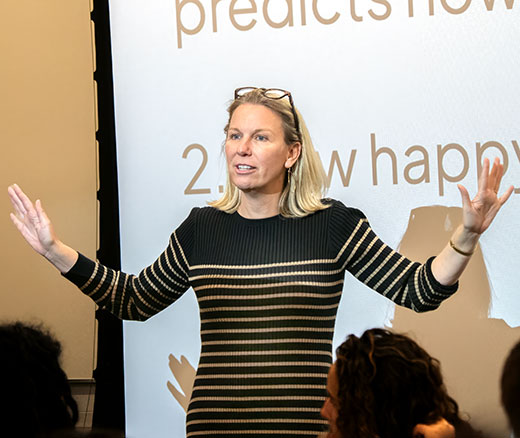
Three Studies by LDI Senior Fellows Win Clinical Research Forum Awards
Chen and Roberts in Top 10, Groeneveld a Top 10 Finalist
Blog Post

Over the past two decades, the Cystic Fibrosis Foundation (CF Foundation) reaped a stunning windfall by helping to develop a series of new drugs for the lung-clogging disease. Its investment in the drug firm Vertex led to a new class of drugs, starting in 2012 with Kalydeco, that effectively made cystic fibrosis a treatable disease for many people.
For its efforts, the CF Foundation secured more than $4 billion in payments to reinvest in drug development. Its success underscored the emergence of a new paradigm—venture philanthropy—empowering patient groups to fund new treatments and share in the fruits and risks of those investments.
Drug discovery famously generates far more failures than successes, and the foundation’s windfall appears to be a high-water mark so far, said LDI Senior Fellow Matt McCoy, who studies the trend. Still, the field shows “a lot of singles and doubles” and appears to be growing.
McCoy along with LDI Senior Fellows Justin Clapp and Holly Fernandez-Lynch recently analyzed the self-reported profiles of 130 patient groups in an affinity network promoting venture philanthropy. Big bets remain rare, they found. Only 12% of the patient groups reported investing in for-profit firms.
“When people talk about the potential of venture philanthropy, the Cystic Fibrosis Foundation remains the go-to success story, and for good reason,” McCoy said. “They funded the development of transformative drugs and earned a massive financial windfall which they reinvested back into their research mission. But their first big breakthrough came more than a decade ago. We haven’t seen scientific and financial success on a comparable scale.”
Patient groups may lack the money to undertake this costly, long-term work, McCoy said. And while some groups will surely score bigger gains than others, it’s up to policymakers to distribute research funds widely to address any inequities, he added.
Patient groups are also creating closer collaborations with academic and industry partners, raising ethical concerns. It’s key to watch how these groups follow patient interests, said McCoy, an Assistant Professor in the Department of Medical Ethics and Health Policy at Penn’s Perelman School of Medicine.
He talks more about the venture philanthropy trend below.
McCoy: It’s clear that a growing number of patient groups are interested in “venture philanthropy” in the broad sense of wanting to take a more active and entrepreneurial approach to supporting research. One indirect indicator is the growing membership in affinity networks like The Research Acceleration and Innovation Network or TRAIN, which describes itself as a group of “organizations that are pioneering principles of venture philanthropy.” I haven’t tracked it incredibly closely, but the group’s membership has roughly doubled over the last decade. And to give you a sense of recent growth, when we began collecting data for this project in March 2024, there were just under 140 members in TRAIN. Today, the network reports over 180 members, ranging from small rare-disease groups to some of the largest and best-known patient organizations in the U.S. This suggests the growing influence of the idea that patient groups should be more strategic, more outcomes-oriented, more like venture capital investors in the way they support research, though what that means in practice isn’t always clear, which is why we wanted to pursue this study.
The term venture philanthropy is also used in a narrower sense to refer to the practice of patient organizations investing in for-profit biopharmaceutical companies. We don’t have great data on how common these sorts of investments are—that’s something I’m working on in ongoing research—but a 2023 report from the analytics firm IQVIA suggests that these kinds of investments were relatively flat over the past decade or so. In this study, we saw something similar. Among the groups we looked at, which were all members of TRAIN, just over 10% of them reported making investments in for-profit companies.
McCoy: We didn’t study the hit rate of these sorts of investments in this study, so I don’t want to overstate my confidence here. But my sense is that there have been a lot of singles and doubles. Fewer home runs. TRAIN has a round-up of some success stories in the case studies section of its webpage. A lot of those we hear about focus on intermediate measures like dollars invested, partnerships launched, or studies funded. These are necessary first steps, since you don’t get to new products without funding research. At the same time, if the ultimate ambition of venture philanthropy is to deliver transformative treatments or even cures, there are fewer examples of that. That doesn’t diminish the value of the intermediate achievements, but it does underscore how long and uncertain the path is from investment to impact.
The other dynamic I think about is the bias toward highlighting success stories. It’s more difficult to see the investments that never pan out because we don’t really know the denominator, i.e., how many investments were made, how many quietly stalled, and why. That makes it hard to assess overall effectiveness, and it’s one of the questions we’re trying to address in our ongoing work.
McCoy: Before this study, there was plenty of commentary on patient organizations embracing principles of venture philanthropy, but it wasn’t clear what that meant in practice. We found that despite notable differences in age, revenue, and disease focus, the organizations we studied share several defining assumptions and practices. They consistently frame the development of new therapies as the most urgent patient need, take on active roles in financing and managing research across the development pipeline, and work to embed themselves within established research and drug development networks through collaborative relationships with industry and academic partners.
At the same time, we also found that some of the most transformative and headline grabbing practices associated with venture philanthropy, particularly direct investment in for-profit companies, are at this point still relatively rare.
McCoy: One concern is that as enthusiasm for venture philanthropy grows, encouraged by commentary and media coverage that emphasizes success stories, some patient organizations may overestimate their capacity as investors and research funders. So honest and deliberate self-assessment is essential to ensuring that venture philanthropy initiatives are pursued responsibly and with realistic expectations. I’ve written about this issue at length in another recent paper.
I’ve also written about the potential for venture philanthropy to widen disparities between research and investment in different disease areas.
The resources required to make major research investments aren’t equally available to all patient communities, so some groups will inevitably outpace others. What’s less clear is how we ought to respond. It’s appropriate for patient organizations to use their resources to advance research that benefits their own communities. As I argue in the second piece cited above, if we’re concerned about achieving more equitable research funding across disease areas, that responsibility properly lies with policymakers and public funding agencies, which have broad obligations to promote the public welfare.
McCoy: Given that this study was exploratory and one of the first on this topic, I think specific recommendations to policymakers are premature at this point. But more generally, I’d say that policymakers, particularly in agencies like FDA and NIH that take steps to engage patient groups in their decision making, need to be cognizant of the fact that some traditional views about what patient organizations are and what they seek to do are becoming outmoded.
In particular, we need to rethink the model for understanding patient organization–industry interactions. A longstanding view treats patient organizations as independent actors whose priorities risk being distorted by financial dependence on industry support. I think our study suggests the emergence of a new model with patient organizations now participating in more open and active forms of collaboration with academic and industry partners. Going forward, I’ll be watching how this evolution informs the way that patient organization understand and pursue patient interests.
One of the things I’m working on now is pulling together and analyzing data on patient group investments in and joint ventures with biopharmaceutical firms. Some of the early work will be descriptive in nature, but in the longer term, we’re thinking about ways to evaluate the success of these investments.
The article, Mapping the Landscape of Medical Venture Philanthropy, was published on Oct. 28, 2025 in AJOB Empirical Bioethics. Authors include Megan M. Shen, Justin T. Clapp, Holly Fernandez Lynch, and Matthew S. McCoy.


Chen and Roberts in Top 10, Groeneveld a Top 10 Finalist

How Political Rhetoric and Behind-the-Scenes Deal-Making Obscure Who Really Pays – or How Much

Even With Lower Prices, Medicare, Medicaid, and Other Insurers Tighten Coverage for Drugs Like Mounjaro and Zepbound Using Prior Authorization and Other Tools

Guidelines Matter, but Lasting Health Requires Investment in Better Food, More Activity, and More Targeted Tools From Medicaid and SNAP

A Wharton–Netter Center Collaboration Uses Experiential Learning to Build a Health Care Workforce Pipeline

Cheaper Housing Could be a Way to Lower Hospitalizations Among Medicaid Patients with Heart Failure